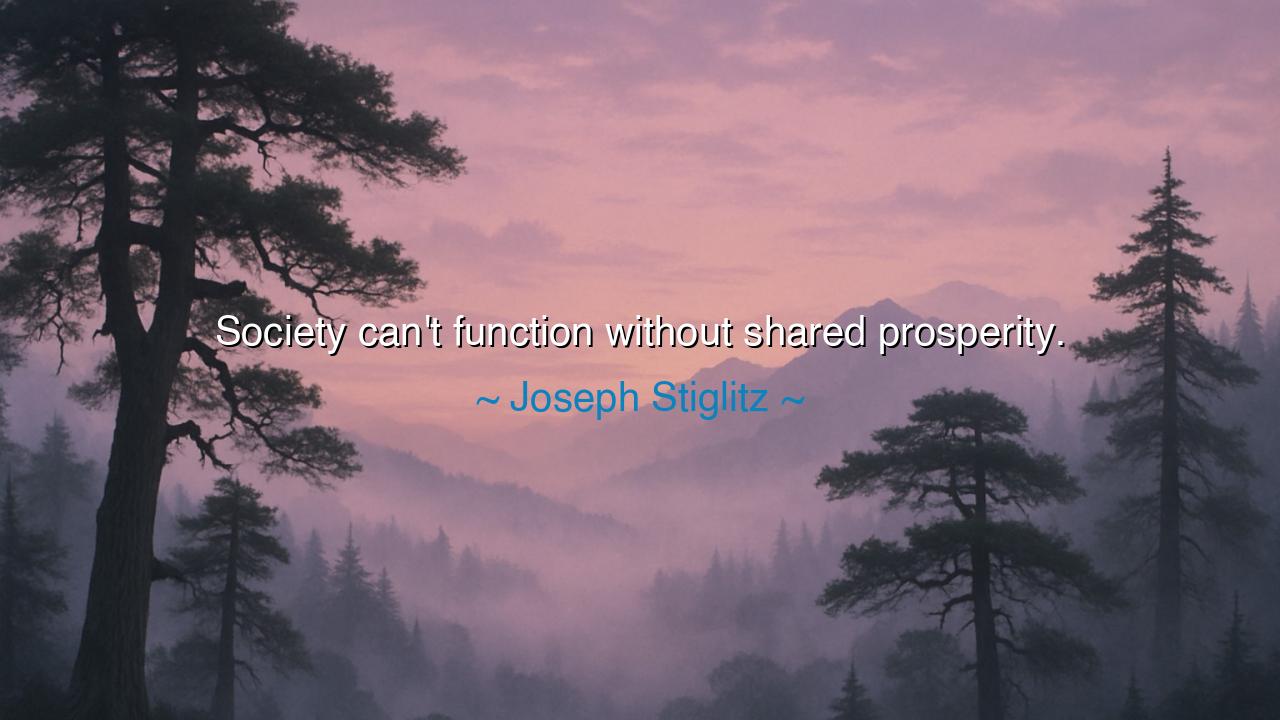
Society can't function without shared prosperity.






Hear now the solemn words of Joseph Stiglitz, spoken as if from the mouth of eternity: “Society can’t function without shared prosperity.” These words are not the idle musings of an economist; they are a trumpet blast, a truth as ancient as civilization itself. For what is a society but the weaving together of many lives, and what is prosperity if it is hoarded by a few? The house of mankind collapses when its wealth lies only in the hands of kings, while the people cry out in hunger. The strength of a nation rests not upon the riches of its elite, but upon the flourishing of all its people together.
From the dawn of time, wise rulers knew this truth. The Pharaohs who stored grain in their granaries during years of abundance did not keep it for themselves alone, but released it to the people in famine, that Egypt might endure. Where wealth was shared, the land prospered; where it was withheld, kingdoms fell to dust. For when the many are abandoned, resentment festers, division grows, and the bonds that tie society together fray until they break. Thus Stiglitz reminds us that prosperity must be shared, else society itself cannot stand.
Consider the great tale of Rome. In its early days, Rome flourished because it welcomed the poor into its legions, rewarded service with land, and bound together citizen and state. But in its decline, wealth became the plaything of the few. Vast estates consumed the countryside, while peasants were driven into poverty. Bread and circuses were thrown to the masses, not as sustenance, but as distraction. And so the glory of Rome crumbled, not from without but from within. The lesson is seared into history: where prosperity is not shared, even the mightiest empire cannot endure.
In our modern age, too, we see this truth unfold. The Great Depression of the 1930s was not born of scarcity alone, but of imbalance—too much wealth gathered in too few hands, too little purchasing power for the many. The system collapsed, and with it, millions of livelihoods. Yet when reforms came—when wages rose, when social protections were established, when prosperity was extended more broadly—society revived, and an era of growth and stability emerged. This was not a miracle, but the inevitable fruit of shared prosperity.
But let no one think this principle applies only to kings and presidents. It speaks to each heart. A family cannot endure if one hoards while others starve. A community cannot flourish if some are exalted while others are crushed beneath the weight of poverty. Even in friendships, the bond is broken if only one gives while the other takes. Thus, Stiglitz’s words are not merely for the powerful, but for every soul who seeks to live rightly: society at every level requires sharing, generosity, and fairness.
The meaning, then, is both heroic and urgent: wealth is not only a measure of what one has, but of what one contributes to the well-being of others. The prosperous must extend their hand, not in charity alone, but in justice—ensuring that opportunity, dignity, and security are within reach of all. For in lifting others, one lifts the whole of society, and thus secures peace and stability for generations to come. To fail in this is to invite division, unrest, and the decay of the very structures upon which all depend.
What, then, shall each of us do? Be generous in spirit and in action. Support fair wages, seek justice in the marketplace, and demand of leaders that they serve not only the wealthy, but the many. Share knowledge, mentor the young, uplift the struggling, and contribute to the strength of your community. In your own life, resist the temptation to measure prosperity by what you alone possess; measure it instead by the well-being you help create in others.
Thus let the words of Stiglitz echo in the hearts of those who would listen: society cannot function without shared prosperity. This is not a burden but a sacred calling. For when prosperity is shared, it becomes not mere wealth, but the seed of harmony, justice, and enduring peace. May these words guide the builders of the future, that they may craft not kingdoms of greed, but societies of abundance where all may thrive.






AAdministratorAdministrator
Welcome, honored guests. Please leave a comment, we will respond soon